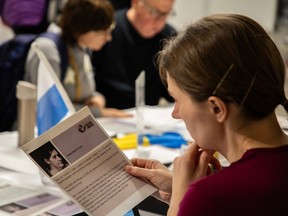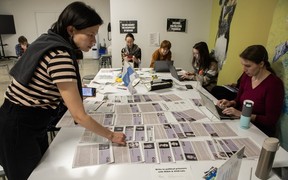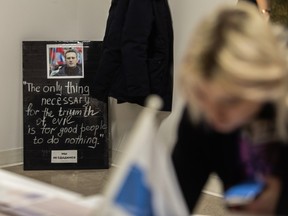
“The prisoner getting a letter shows them that somebody is watching, somebody is thinking and caring about them. It helps keep their sanity.”

Article content
She was arrested, Antonina says, for just being a cook.
Living in the eastern Ukrainian city of Mariupol, which Russia now occupies after one of the bloodiest battles of the war, Vladislava Volodymyrovno cooked for Ukrainian soldiers there and has now been detained by Russia since April 2022.
Article content
She is among more than 4,000 Ukrainians held in Russian captivity, according to the Ukrainian government, and Antonina, 22, who’s Russian by birth but grew up in Montreal, is writing to her.
Advertisement 2
Article content
“I saw that we were born in the same year, so she’s 22, like me. And she was arrested on my birthday,” said Antonina, who only provided her first name because she fears reprisals for family she still has in Russia.
Antonina, along with a dozen or so from Montreal’s Russian community, gathered on Sunday at the Musée d’art contemporain de Montréal (MAC) in downtown Montreal to write letters to prisoners captured by Russia.
The event was organized by the Russian Canadian Democratic Alliance of Montreal, a group of anti-war volunteers. They organize these letter-writing sessions monthly, in venues from cafés to homes, but recently at the museum.
According to one of the organizers, Olga Babina, each month they compile themed profiles of prisoners to focus on. This month is on Ukrainian political prisoners to mark the second anniversary of Russia’s full-scale invasion of Ukraine.
The timing also coincides with the death of Russian opposition leader Alexei Navalny, underscoring the risks faced by those who speak out against the Russian government.

“We’ve prepared information about Ukrainians because it’s the anniversary of the war and we want to highlight the victims of the war,” said Babina, 35. “The prisoner getting a letter shows them that somebody is watching, somebody is thinking and caring about them. It helps keep their sanity.”
Advertisement 3
Article content
Attendees typed their letters, which can be written in English or French before being translated into Russian, instead of using pen and paper. These are sent electronically with the help of OVD-Info, a Russian human rights group, to the prisoners as no mail can be sent between Canada and Russia.
Tell them about your day and include jokes, the organizers advise the writers, while reminding them the prisoner’s fate is in the hands of the Russian officer who reads their letter before it reaches the prisoner.
Those writing don’t know if the prisoners will respond to their letters — or even receive them. But they still write, sharing stories about their day-to-day lives and asking the prisoners about theirs.
“I talked to her about my favourite movie, which is Amélie, the French movie,” Antonina said, speaking about what she wrote to Volodymyrovno. “I talked a bit about how much I value people’s stories, how much I think that many stories that we encounter become a part of our story. And I thanked her for her story in some way becoming a part of mine.”
Babina said she likes to write to less famous prisoners as they will receive less mail. She also said that prisoners sometimes respond, answering questions and sharing details about life inside prison.
Advertisement 4
Article content
Sunday’s event drew Montrealers with no ties to Russia — but no one from the Ukrainian community, Babina said, noting it is complicated. It was followed by a film screening of the documentary 20 Days in Mariupol.
Quebecers Marie-Josée Lemieux and Jean Prémont joined despite having no Russian or Ukrainian relation but wanted to show their support for Ukraine.
“I hope my letter can distract her for a moment, reading about somebody else very far with a different situation,” said Lemieux, a nurse who said she chose to write a letter to a Ukrainian mother because she’s also a mother. “Maybe it will help her to have a good moment for a few minutes.”
Prémont, a retired educator, added: “It’s important for them to know that somewhere in the world, somebody’s thinking about them.”
The volunteers started organizing letter-writing after the start of the invasion, along with hosting other events and rallies, to show support for Ukraine.

Entering the third year of the war, Russia maintains that it is a “special military operation.” Russia currently occupies just under a fifth of Ukrainian territory.
Advertisement 5
Article content
More than 10 million Ukrainians have also been displaced by Russia’s invasion, four million internally and six million leaving for other countries, according to the United Nation’s High Commissioner for Refugees.
Political squabbling in the U.S., over Ukrainian funding and recent battleground victories for Russia, however, has left Western analysts increasingly worried about the war’s direction.
Prime Minister Justin Trudeau and his G7 counterparts on Saturday pledged again their “unwavering” support but Ukraine is continuing to experience resource problems as Russia attacks.
In Montreal, a disparity of ideas exists within the Russian expat community over the invasion, said Babina.
“The range of opinion is insane. I myself have not met a lot of Russian expats who live in Canada and are pro-war. But for example, we had a Ukrainian-Canadian woman … she said that she lost all of her Russian friends after the beginning of the war because they all supported it.”
Recommended from Editorial
Advertisement 6
Article content
This hasn’t stopped those who oppose it from organizing and showing their support for Ukraine, knowing that it might risk their families’ safety back in Russia and any chance of return they might have.
Weighing on many minds of anti-war Russian expats in Montreal is the arrest of U.S.-Russian citizen Ksenia Karelina, detained for treason after donating just over $50 to a Ukrainian charity.
More than 1,000 people in Russia remain imprisoned for politically motivated prosecutions, according to OVD-Info.
Babina says she would likely face prison if she returns to Russia — but she remains undeterred, with more events scheduled over the war and the death of Navalny. Next month’s letter writing will be devoted to imprisoned women.
“I’m here and I have this privilege to speak freely. To use my right to free speech. My family and people in Russia, my friends, they don’t have this,” she said. “It’s about giving voice to those who cannot speak up in Russia.”
Article content

